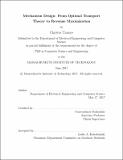Mechanism design : from optimal transport theory to revenue maximization
Author(s)
Tzamos, Christos
DownloadFull printable version (1.175Mb)
Other Contributors
Massachusetts Institute of Technology. Department of Electrical Engineering and Computer Science.
Advisor
Constantinos Daskalakis.
Terms of use
Metadata
Show full item recordAbstract
A central problem in Economics and Algorithmic Game Theory is the design of auctions that maximize the auctioneer's expected revenue. While optimal selling of a single item has been well-understood since the pioneering work of Myerson in 1981, extending his work to multi-item settings has remained a challenge. In this work, we obtain such extensions providing a mathematical framework for finding optimal mechanisms. In the first part of the work, we study revenue maximization in single-bidder multi-item settings, connecting this problem to a well-studied problem in measure theory, namely the design of optimal transport maps. By establishing strong duality between these two problems, we obtain a characterization of the structure of optimal mechanisms. As an important application, we prove that a grand bundling mechanism is optimal if and only if two measure-theoretic inequalities are satisfied. Likewise, we obtain necessary and sufficient conditions for the optimality of any mechanism in terms of a collection of measure-theoretic inequalities. Using our machinery we derive closed-form solutions in several example scenarios, illustrating the richness of mechanisms in multi-item settings, and we prove that the mechanism design problem in general is computationally intractable even for a single bidder. In the second part of the work, we study multi-bidder settings where bidders have uncertainty about the items for sale. In such settings, the auctioneer may wish to reveal some information about the item for sale in addition to running an auction. While prior work has focused only on the information design part keeping the mechanism fixed, we study the combined problem of designing the information revelation policy together with the auction format. We find that prior approaches to this problem are suboptimal and identify the optimal mechanism by connecting this setting to the multi-item mechanism design problem studied in the first part of the work.
Description
Thesis: Ph. D., Massachusetts Institute of Technology, Department of Electrical Engineering and Computer Science, 2017. This electronic version was submitted by the student author. The certified thesis is available in the Institute Archives and Special Collections. Cataloged from student-submitted PDF version of thesis. Includes bibliographical references (pages 191-196).
Date issued
2017Department
Massachusetts Institute of Technology. Department of Electrical Engineering and Computer SciencePublisher
Massachusetts Institute of Technology
Keywords
Electrical Engineering and Computer Science.